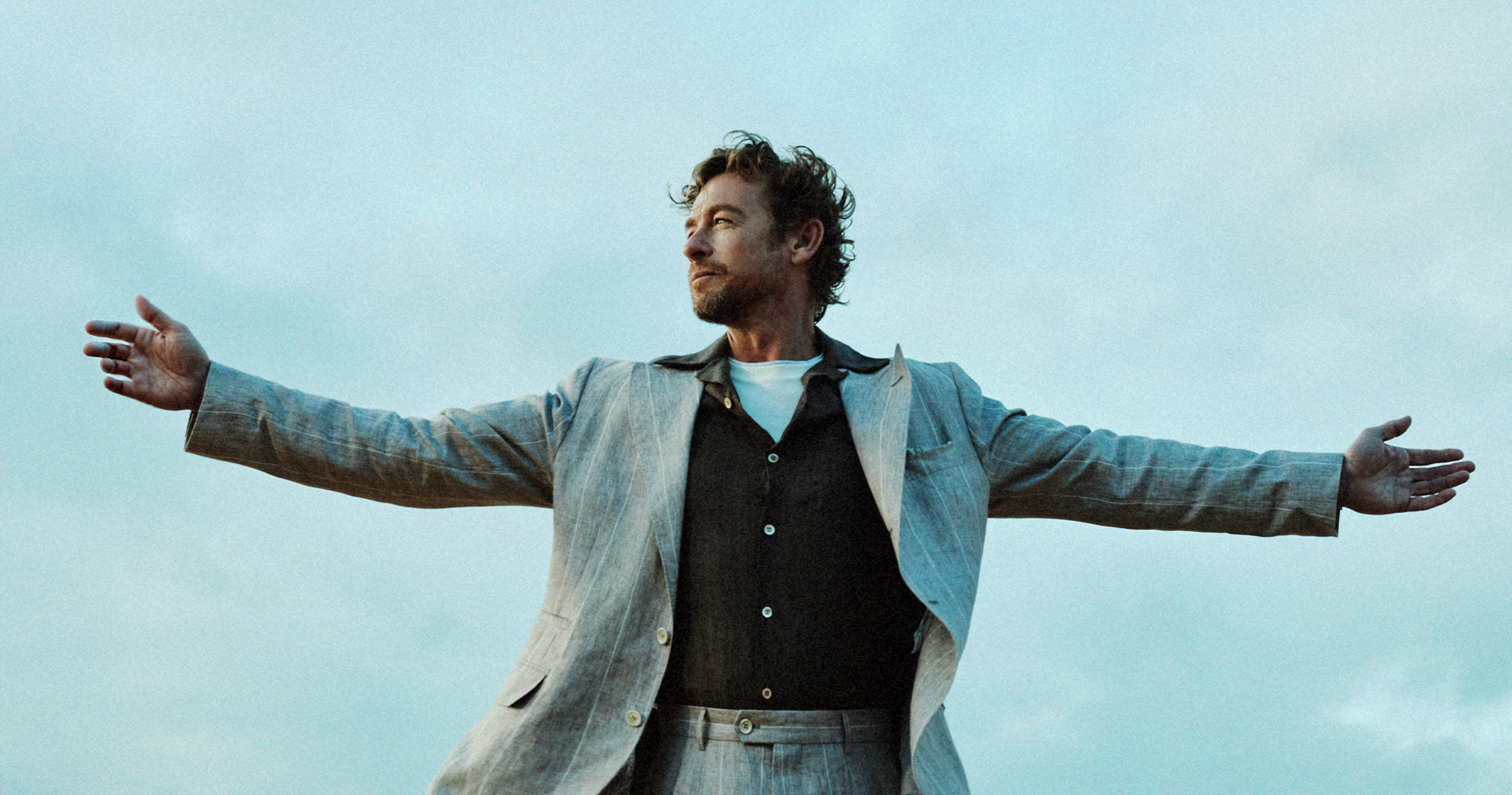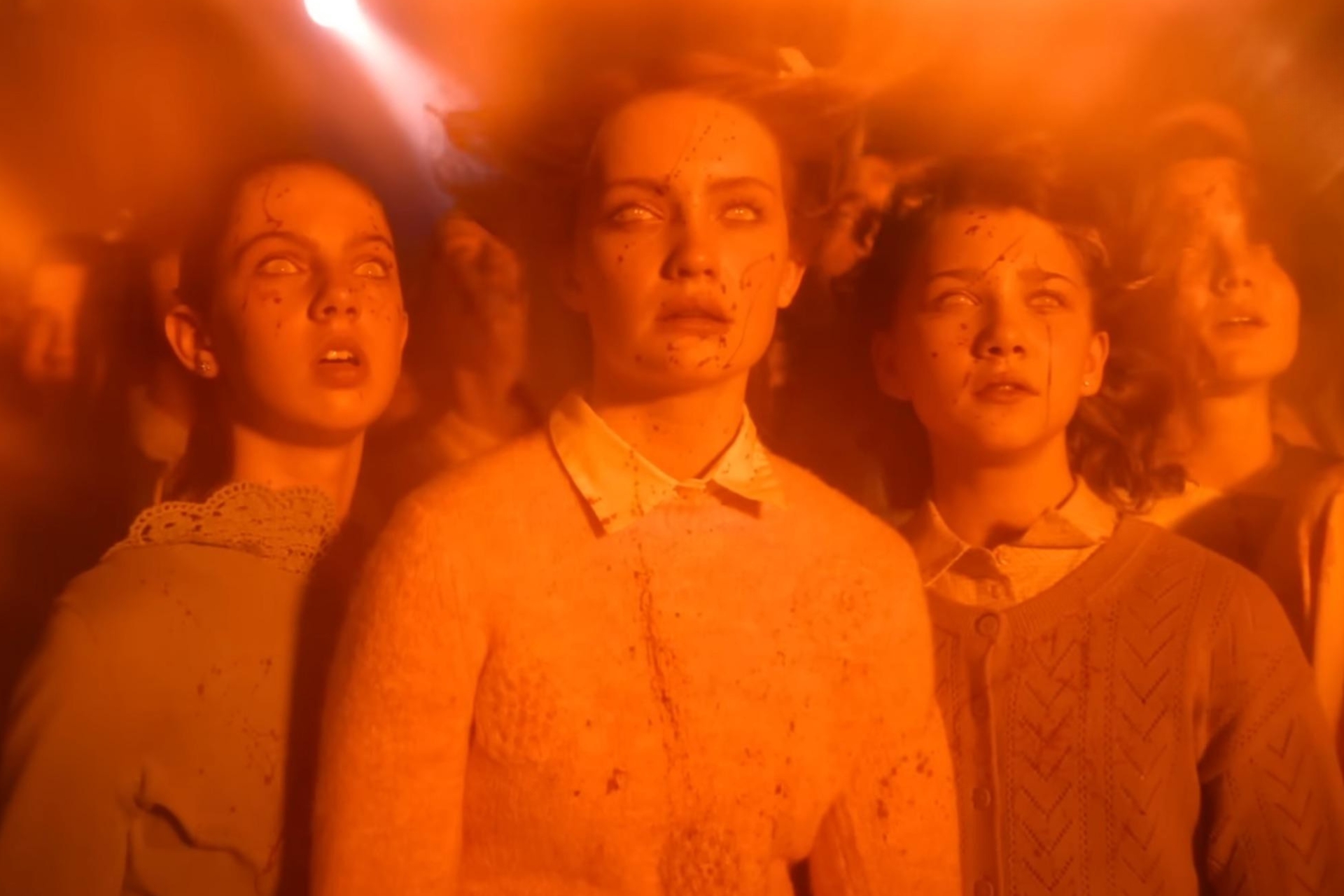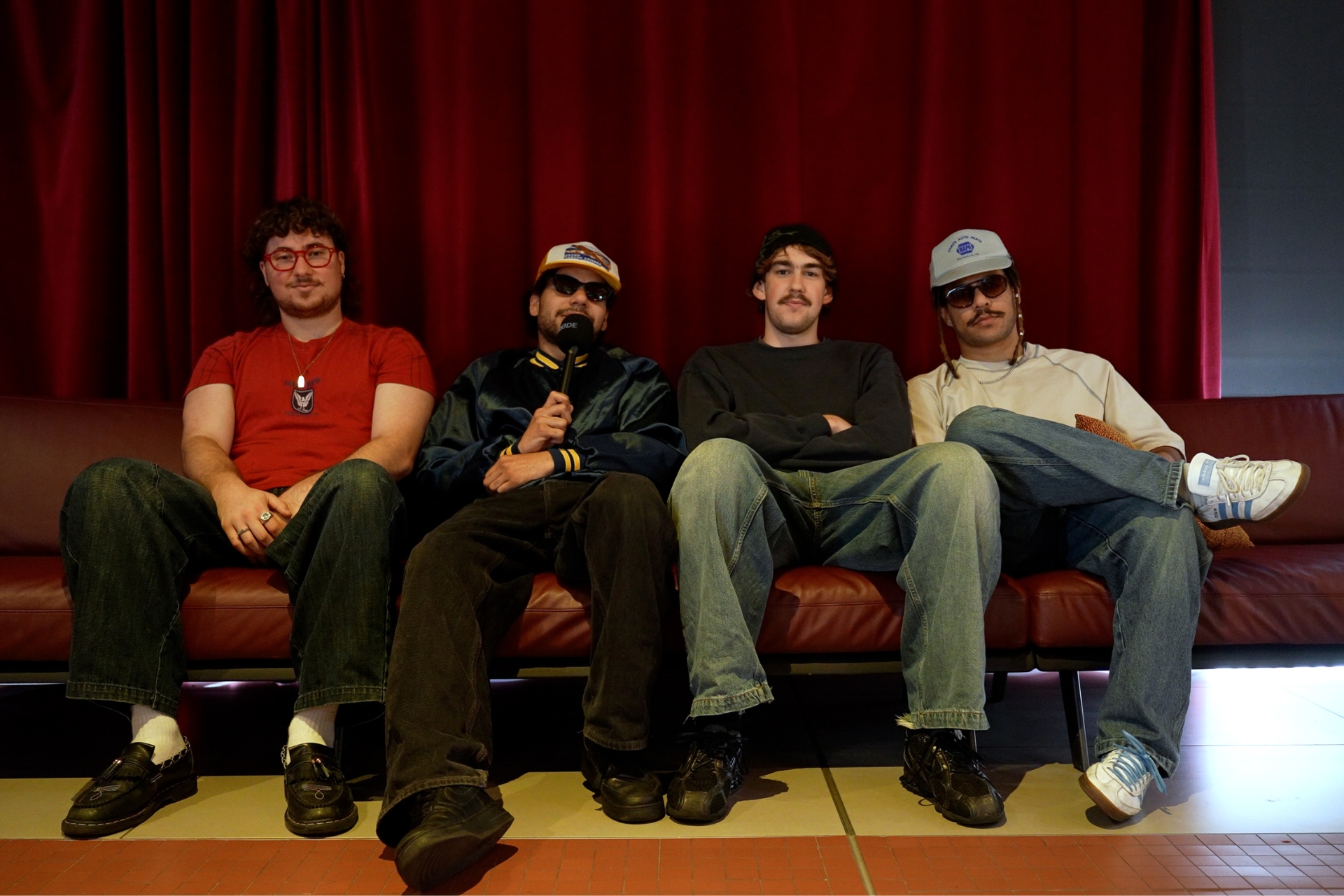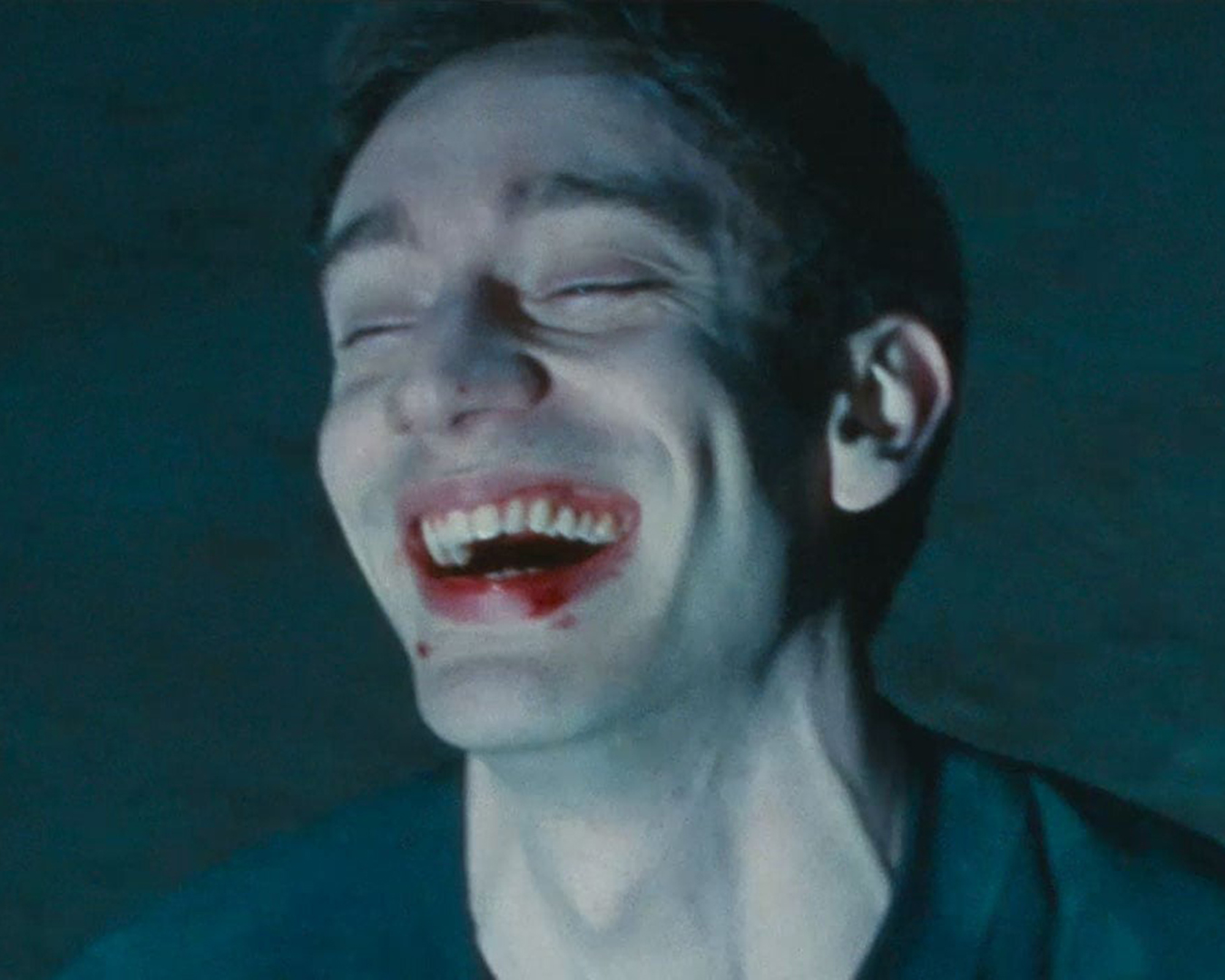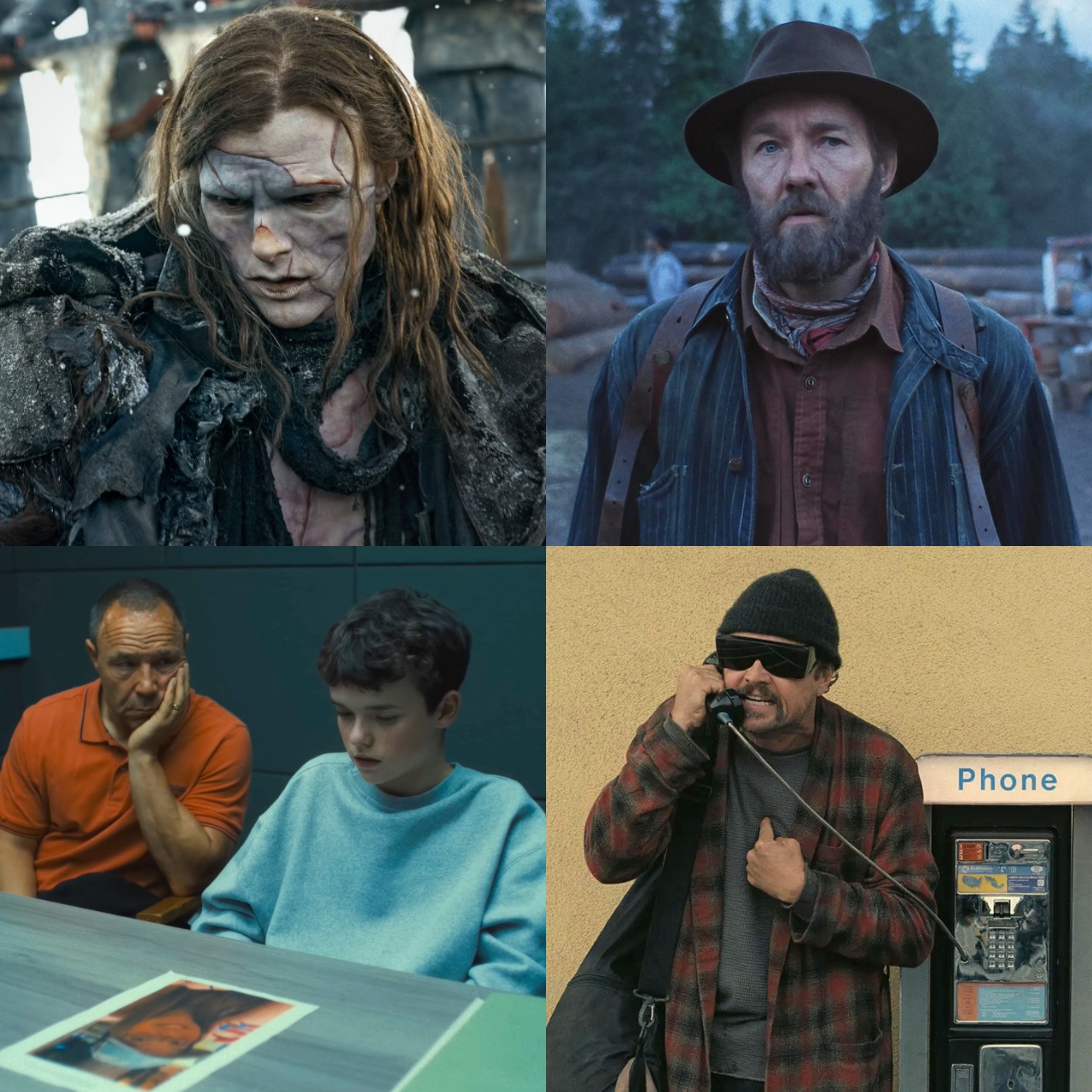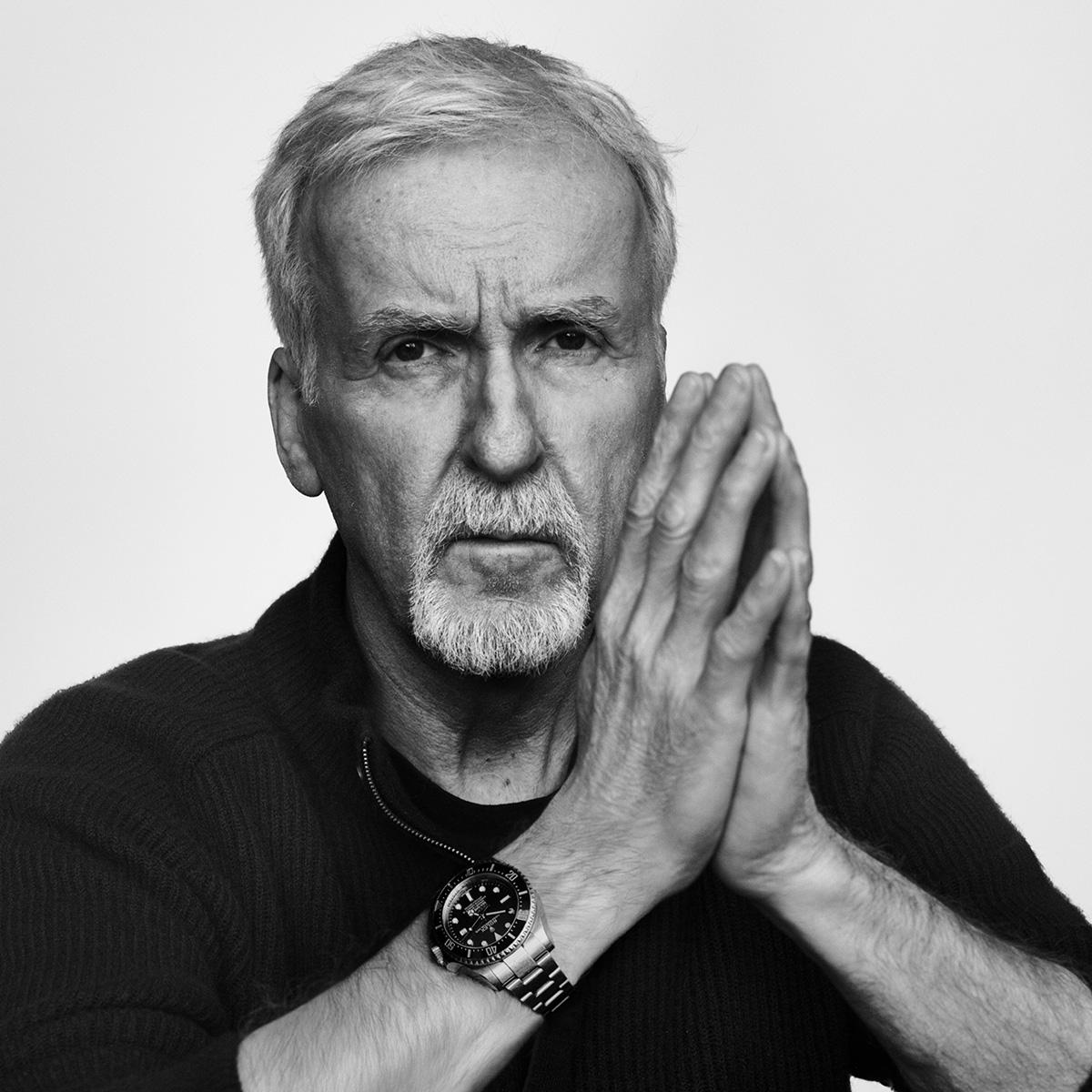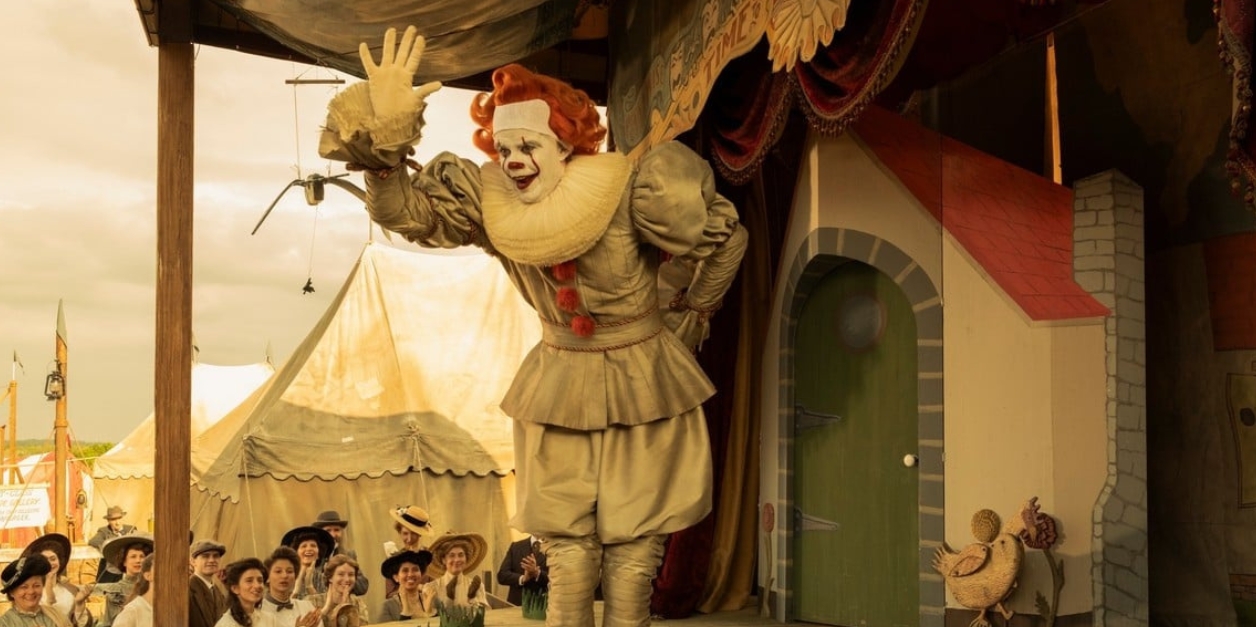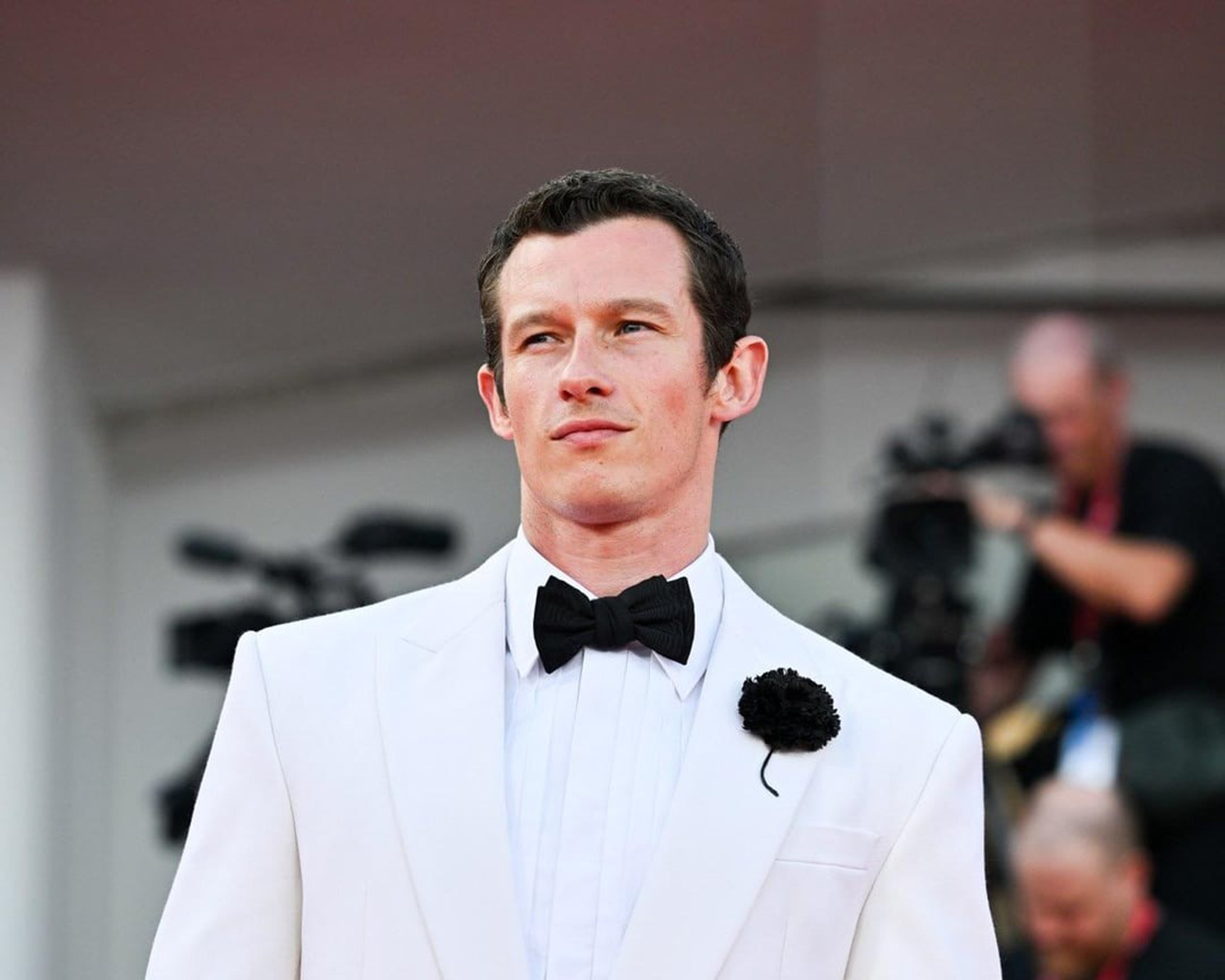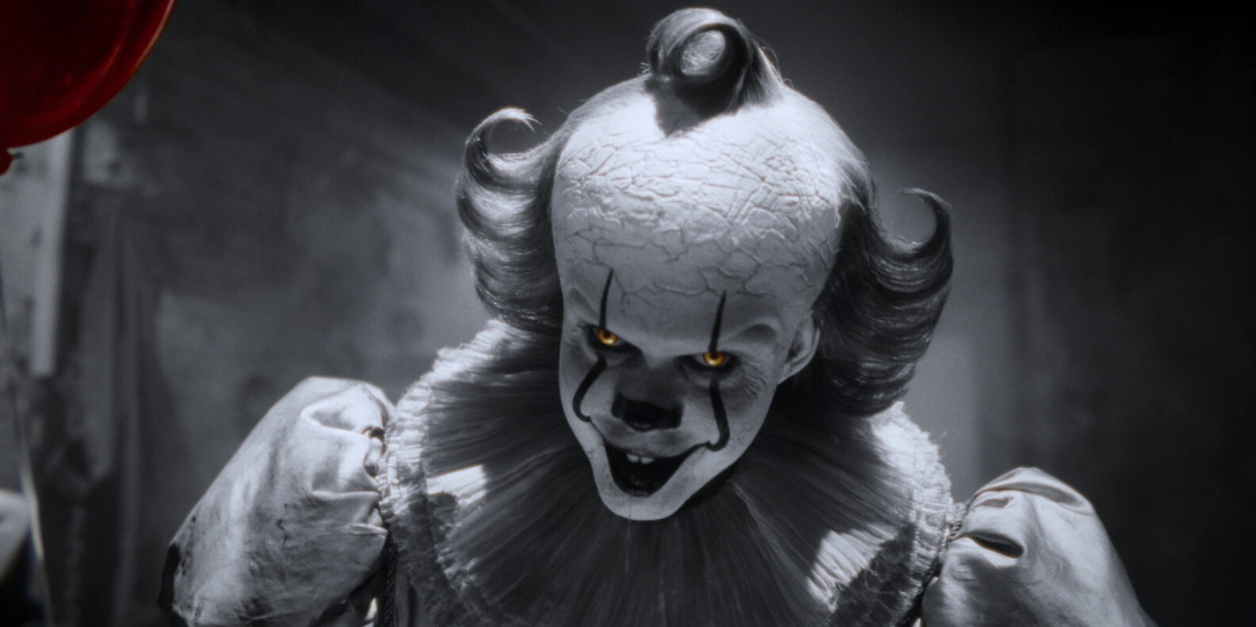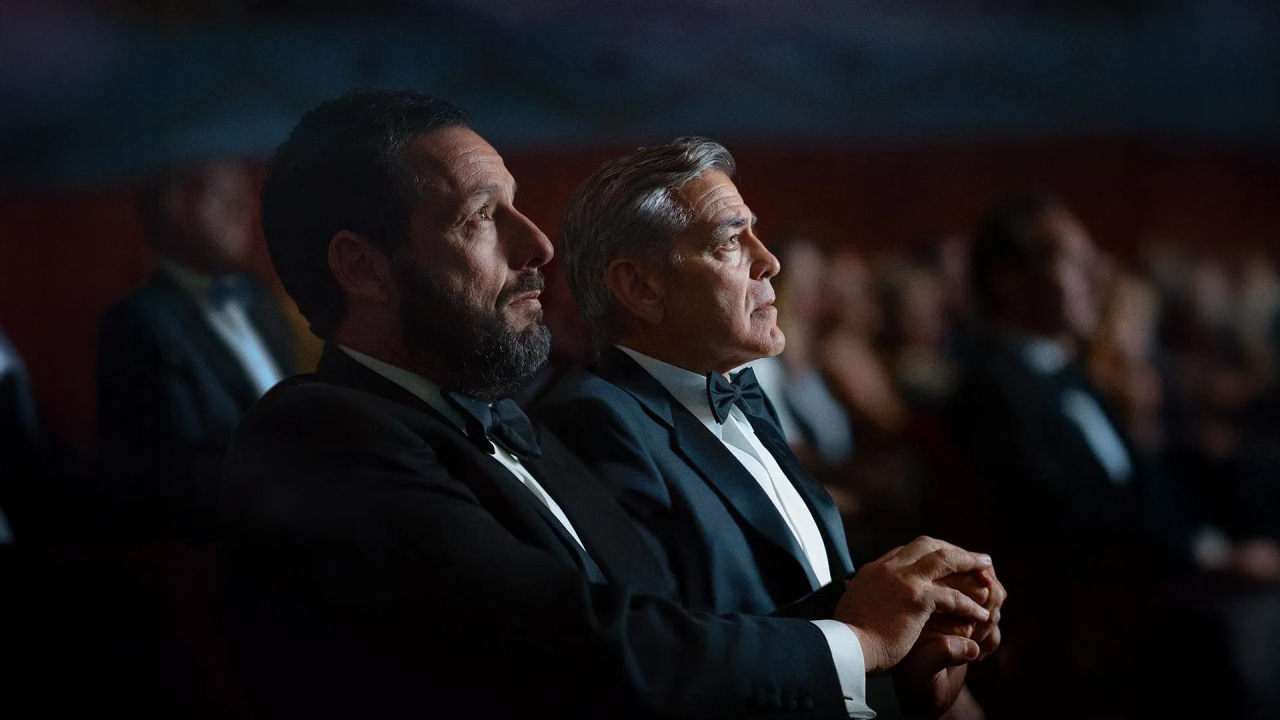AN OLD HOLDEN is motoring down a sandy South Australian beach on a sunny day – the kind of day Keith Mulvaney might refer to as a ‘pearler’. Inside the car, Simon Baker, who plays the character of Keith in the small-screen adaptation of Richard Flanagan’s Booker Prize-winning novel The Narrow Road to the Deep North, is driving with one hand on the steering wheel. Jacob Elordi, who plays Dorrigo Evans, Keith’s nephew by marriage, is riding shotgun with a wiry Jack Russell by the name of Miss Beatrice in his lap. The type of guy that could talk underwater with a mouthful of marbles, Keith barely draws breath as he asks when Dorrigo will be shipping out to war, and tells him all about the country pub he runs with his younger wife, the beautiful Amy. The scene ends with Keith turning the car up a sand dune, as he makes an offering he’ll later regret: “You best enjoy your weekend here, mate. What’s mine is yours.”
“You know, the brakes in that car didn’t work,” Baker tells me. “So we’re driving along, Keith is talking, talking, talking, and I have my hand on the handbrake the entire time.” Judging by the childlike grin on his face, any danger of the car not braking properly only added to the energy of the scene. “We could take risks and play around,” he says of his time making the limited series, which is directed by two-time Palme d'Or-nominated director Justin Kurzel of Snowtown, Macbeth and Nitram fame. “There was a sense of free-flowing ease to the whole project that I loved.”
I’m standing next to Baker on a beach just north of Sydney as he recounts this anecdote. It’s a stormy autumn day. The wind is howling. The rain is beating down. The headland is being thumped by waves so messy and ferocious, even the local contingent of surfers has decided against paddling out. Not only does this weather fly in the face of the ‘pearler’ classification, it makes executing an outdoor photoshoot particularly trying. Conveniently, the star of this shoot couldn’t feel more at home among the elements. “Aren’t you glad it’s like this?” exclaims Baker as he wraps his coat around himself, the wind whipping his sandy-blond hair every which way. “It would be so much more boring if it was a perfect, sunny day.”
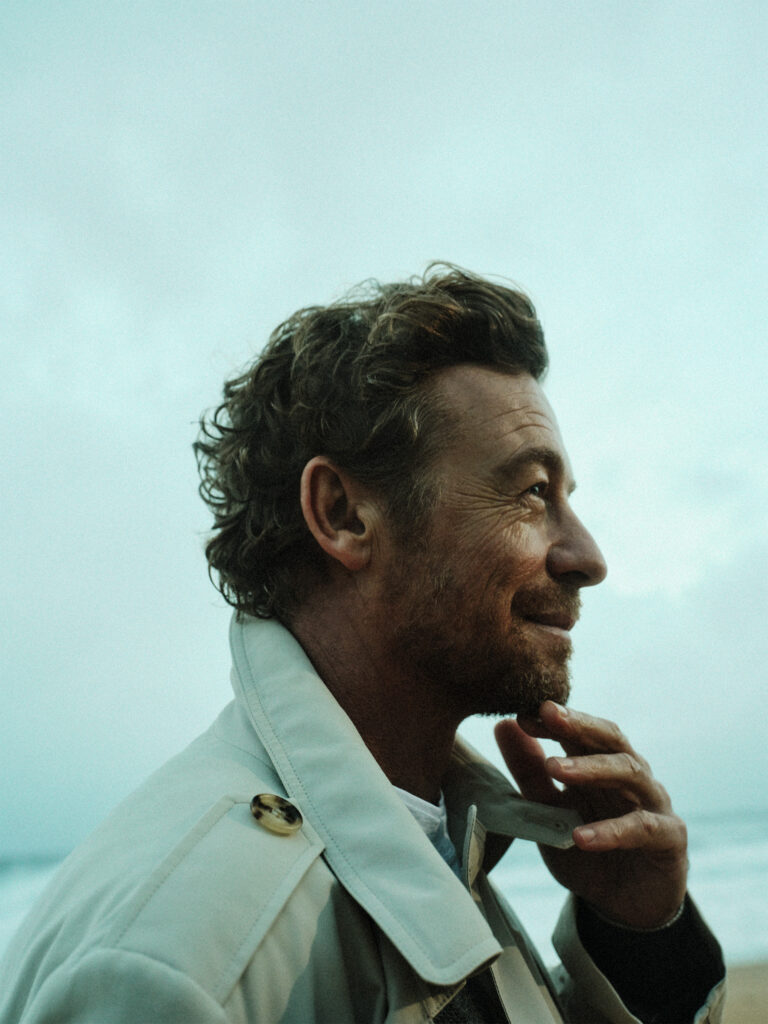
Watching him breathe in the briny ocean air, his smiling eyes bright with aliveness, you have to wonder if this is the Simon Baker of The Mentalist fame – the Emmy-nominated actor who spent seven-and-a-bit years inside a dark Hollywood studio reprising the role of Patrick Jane in one of TV’s favourite procedural dramas.
“When I lived in the States, I was often asked what I missed most about it here,” he says, as we sit overlooking the waves after the photoshoot has wrapped. “And the immediate, visceral feeling was, you know, how I felt on a rainy morning at the end of March. It was the smell of the ocean, those things.” In 2016, after leaving LA, the actor reconnected with that feeling, moving to the Northern Rivers region of NSW, where he spent a lot of time as a kid. He became involved in community initiatives like Surfers for Climate, and enjoyed mowing the lawn, tending to his garden and hanging out with his kids like a regular dad.
“Once you start to assimilate back into our culture, you also realise there’s a beautiful frankness to Australians that is priceless,” he adds. “There’s no flowery way of putting things, it’s just direct. And that level of authenticity is grounding. It’s like a cosy blanket. It’s very comfortable and familiar for me.”
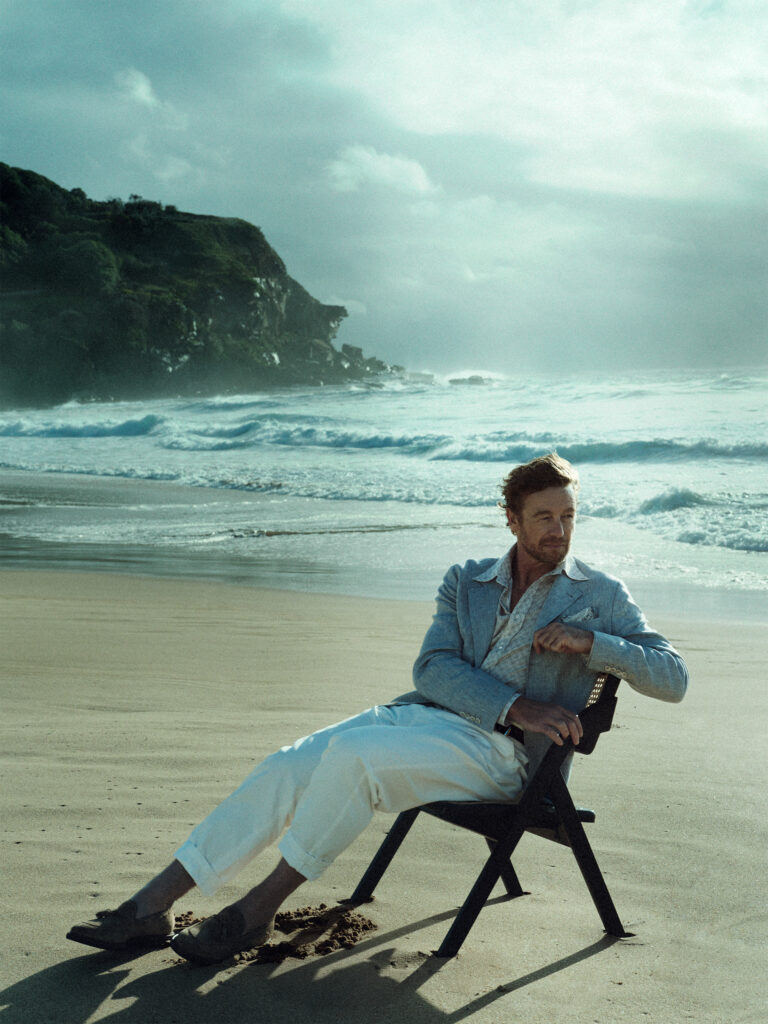
BASED ON FLANAGAN’S award-winning novel, over the course of five episodes, Prime Video's The Narrow Road to the Deep North tells the story of Dorrigo Evans, a talented young surgeon who, after joining the Australian Imperial Force and being captured during 1942’s Battle of Java, is sent to a Japanese prisoner of war camp deep in the Burmese jungle. There, Dorrigo is tasked with keeping his regiment alive, as, starved, beaten and riddled with disease, they’re forced to build what would become the site of one of the most deadly war crimes committed by Japan during World War II: the Thai-Burmese Railway.
Adapting the story for the screen was a complex, ambitious endeavour – it unfolds over half a century, the ghost of love sustaining Dorrigo as he survives the war, only to haunt him later in life as he reckons with the effects of his infidelity on his marriage, and the atrocities he witnessed in the camp (celebrated Irish actor Ciarán Hinds plays the older Dorrigo; Elvis’ Olivia DeJonge plays the younger Ella, Dorrigo’s wife, while veteran Australian actress Heather Mitchell plays Ella later in life). When Flanagan entrusted his book to Kurzel, he had one request: that Kurzel make the story his own. Understanding Dorrigo’s point of view, and the role memory plays in the series, was crucial to the success of the adaptation, Kurzel tells me. So was taking a bit of creative license with certain characters, chief among them Uncle Keith Mulvaney.
While in the novel, Keith is a gruff, hardened type, Kurzel and screenwriter Shaun Grant pictured him as more charming and effusive; a salt-of-the-earth publican who is thrilled at the prospect of having his strapping young nephew come to stay before serving his country in war. When casting Keith, Kurzel knew whom to call right away. “I’ve always been a huge fan of Simon’s,” he says. “There's just a charisma and a masculinity, something classic about him that I thought would be really great.”
“I could bend the truth a bit and say that I've been researching this character for many, many years,” chuckles Baker. He’s sitting on a white couch inside his home; it’s a week before his Esquire photoshoot, and our first time speaking. “I know a few publicans. I know that energy. I’ve spent my fair share of time in small-town, country pubs. Keithy . . . he’s an optimistic, friendly guy with an edge, but he's very sensitive and vulnerable at the same time.” It’s this dichotomy that Baker has found himself gravitating towards, especially recently. “It’s the masculinity that doesn't get spoken about,” he says with a shrug. “I guess I feel an obligation to portray that side of masculinity, because it gets overlooked a lot.”
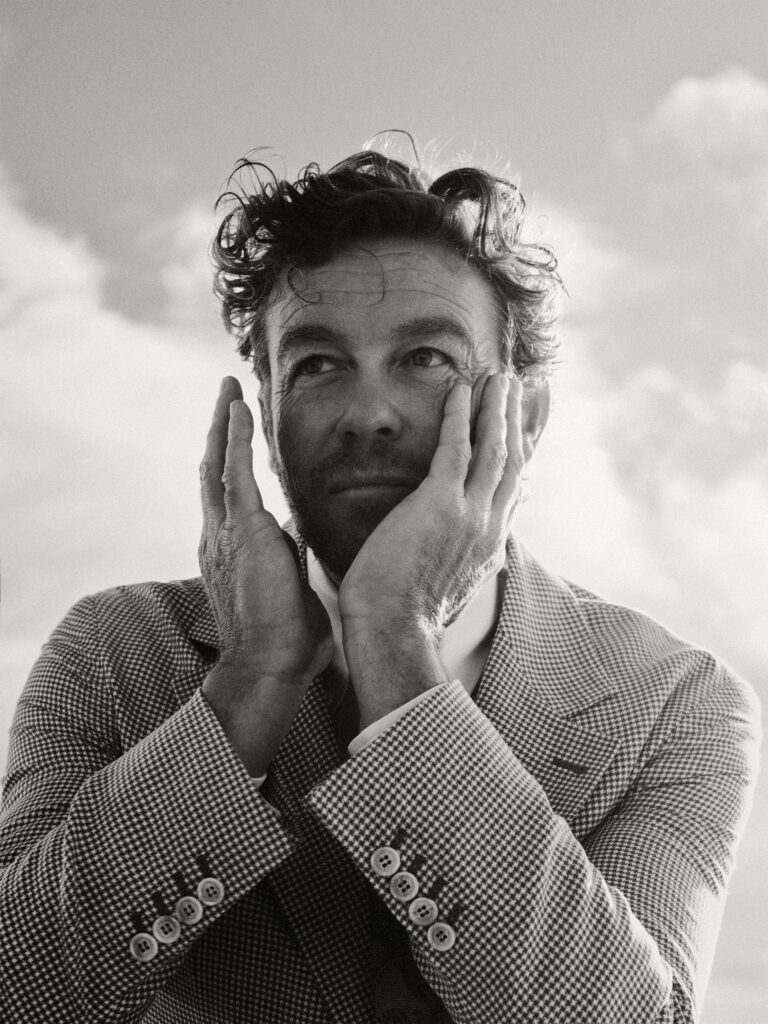
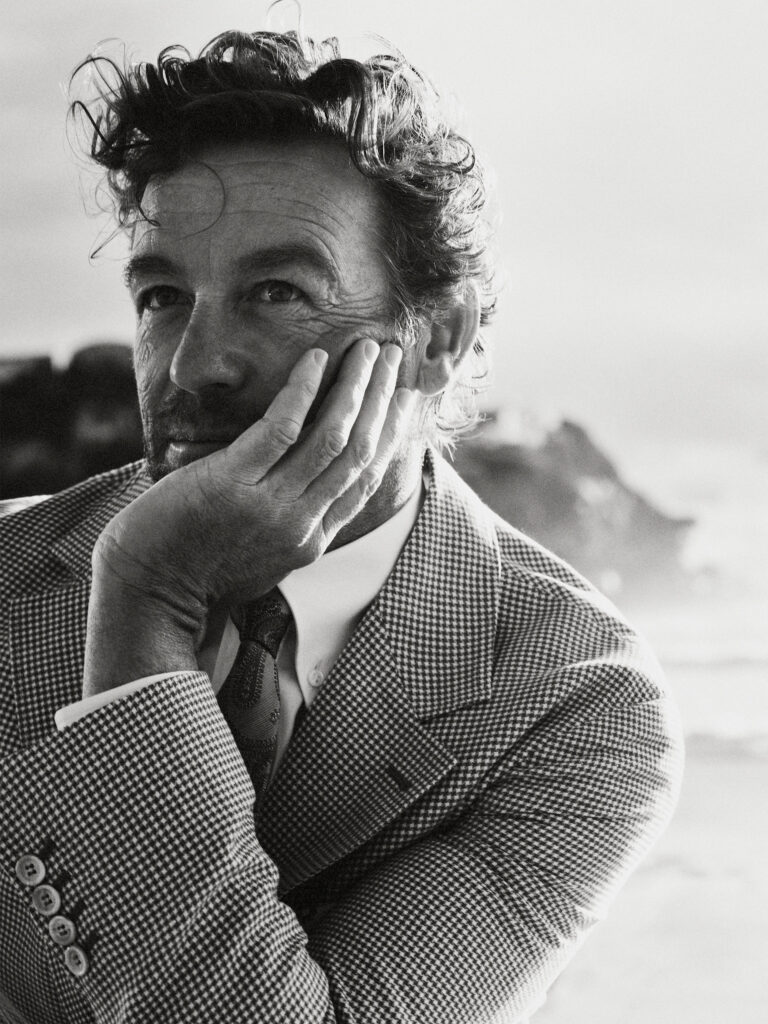
In the series, Baker shares the majority of his scenes with Elordi and Australian actor Odessa Young, who gives a heartbreakingly beautiful performance as Keith’s wife, Amy Mulvaney. Ultimately, Keith’s hospitality and openness are taken advantage of, when his wife and nephew begin a passionate affair right under his nose, igniting the love that torments Dorrigo as he moves through the war and into the rest of his life. As Keith cottons on, his interactions with Dorrigo grow increasingly tense. (At one point, in a scene that was improvised, I half-expect Keith to hurl a rock he’s picked up at Dorrigo’s head. He refrains.)
“Dorrigo . . . he’s a reactive character,” says Baker, when I ask what it was like to bring that tension to life opposite Brisbane-born Elordi, who, after playing the jock in The Kissing Booth series (2018 and 2020), has worked to establish himself as an actor capable of transcending his romcom origins. “I mean, that’s the whole nature of Dorrigo – he’s reactive. And so my experience of working with Jacob was like, I was doing all the fucking work.” Baker jests. “But I think the interesting thing about Jacob is he has the blessings of being this glorious physical type. But he wants to be a really good actor, so he takes it really seriously.”
Presumably, this forms part of the reason why Elordi, who has just finished work on the big-budget Emerald Fennell adaptation of Wuthering Heights alongside Margot Robbie, signed on to The Narrow Road to the Deep North. Less interested in making commercial bangers than he is in bringing complex stories that expose the best and worst of humanity to life, Kurzel is a director every actor seems to want to work with; a director who gives his cast the time and space to make characters their own.
"I think when I was YOUNGER, people sort of saw me as this ‘pretty blond boy’. And in my HEAD, I was like, I’m more. I want to do MORE."
“Justin . . . there’s a really confident but fearless approach. He’s just seeking all the time and nothing’s ‘wrong’,” offers Baker, of why actors like Elordi, and himself – as well as more obscure names like cult Japanese actor Shô Kasamatsu, who plays the violent Major Nakamura in Narrow Road – are lining up to work with Kurzel. For Elordi, working on a Kurzel production brings with it the opportunity to flex his skills in a way returning to the set of Euphoria, where he’ll reprise his role of the angry, sexually repressed jock Nate Jacobs for a third season, might not. “This is just purely an assumption, this is not founded on anything,” Baker qualifies. “But I think Jacob is really committed to working, and doing it the right way.”
The way Baker is speaking, I wonder if there’s a part of him that relates to a genetically gifted actor whose ambitions go beyond phoning in heart-throb performances.
“Yeah. I think everything that I just said before is based, in some way, on me. There were definitely parts of Jacob that I could sort of see myself in, when I was younger,” nods Baker. “I started acting when I was younger. I don’t think I ever had the opportunities that he’s had and will continue to have. When I was his age, I was married with two kids and trying to support a family and work at the same time. So everyone’s experience is going to be different. But yeah, I think when I was younger, people sort of saw me as this ‘pretty blond boy’. And in my head, I was like, I’m more. I want to do more. As a human being, there’s more for me to give and share – more complex stuff that exists inside me. That’s why I became an actor.”
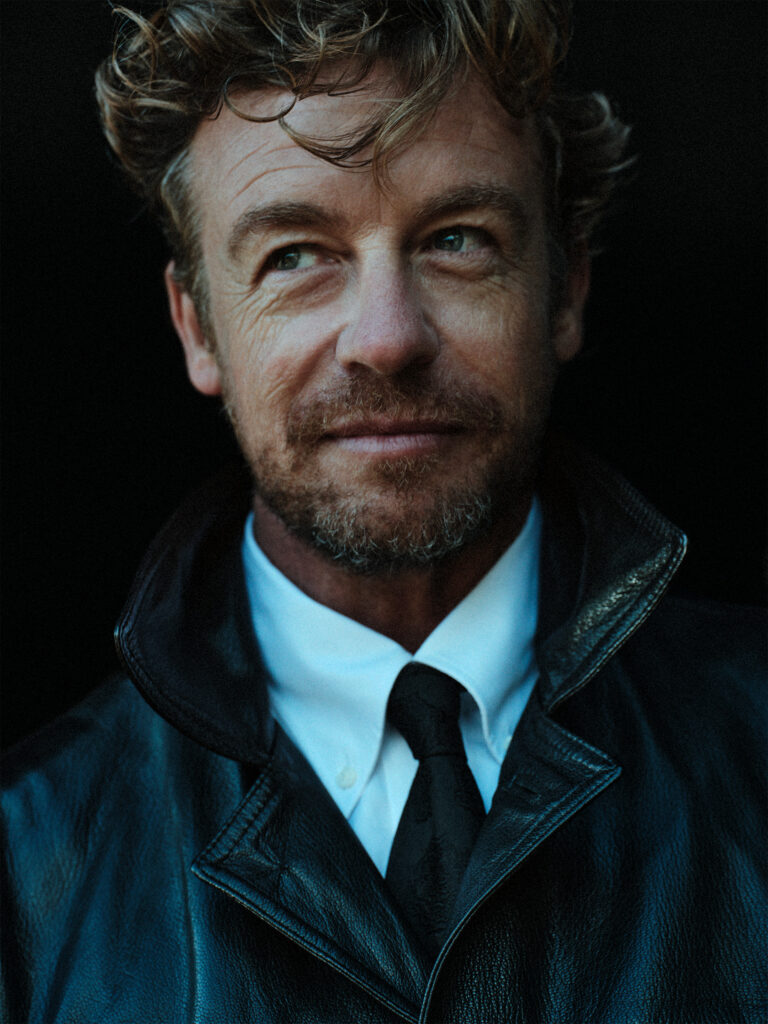
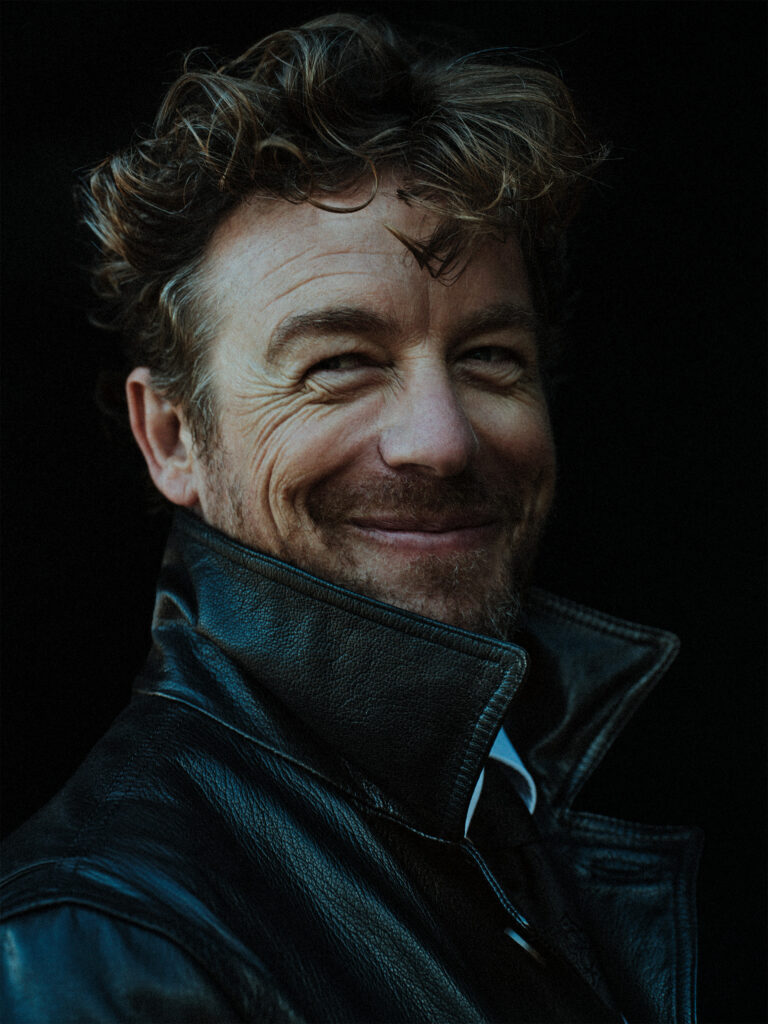
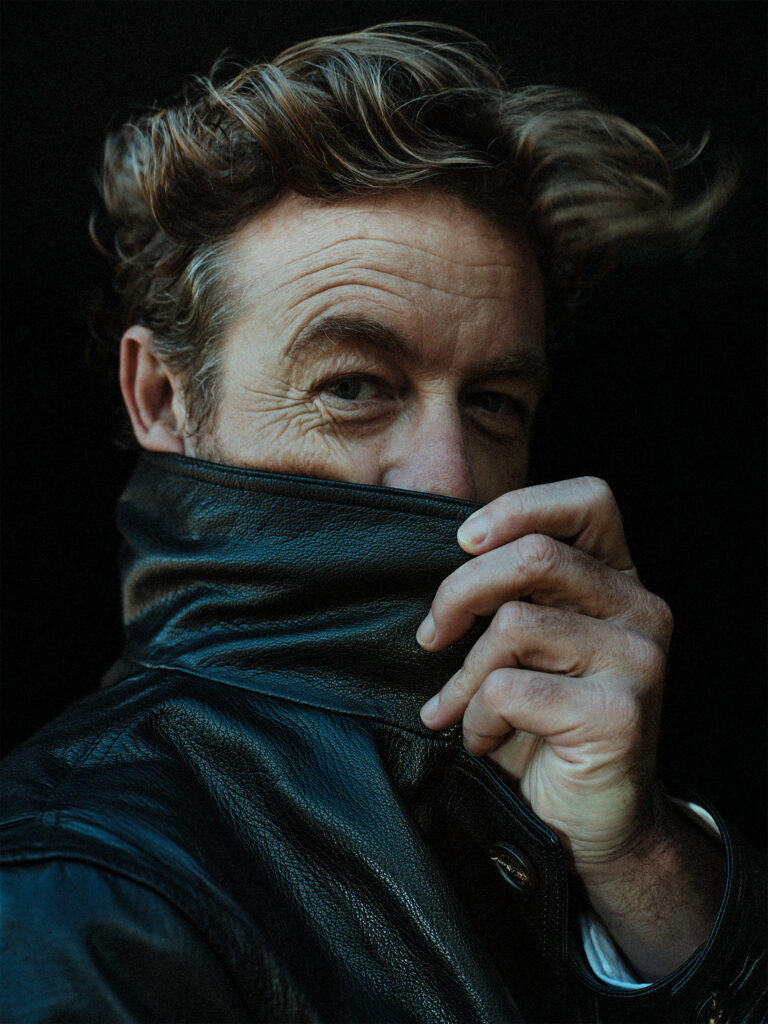
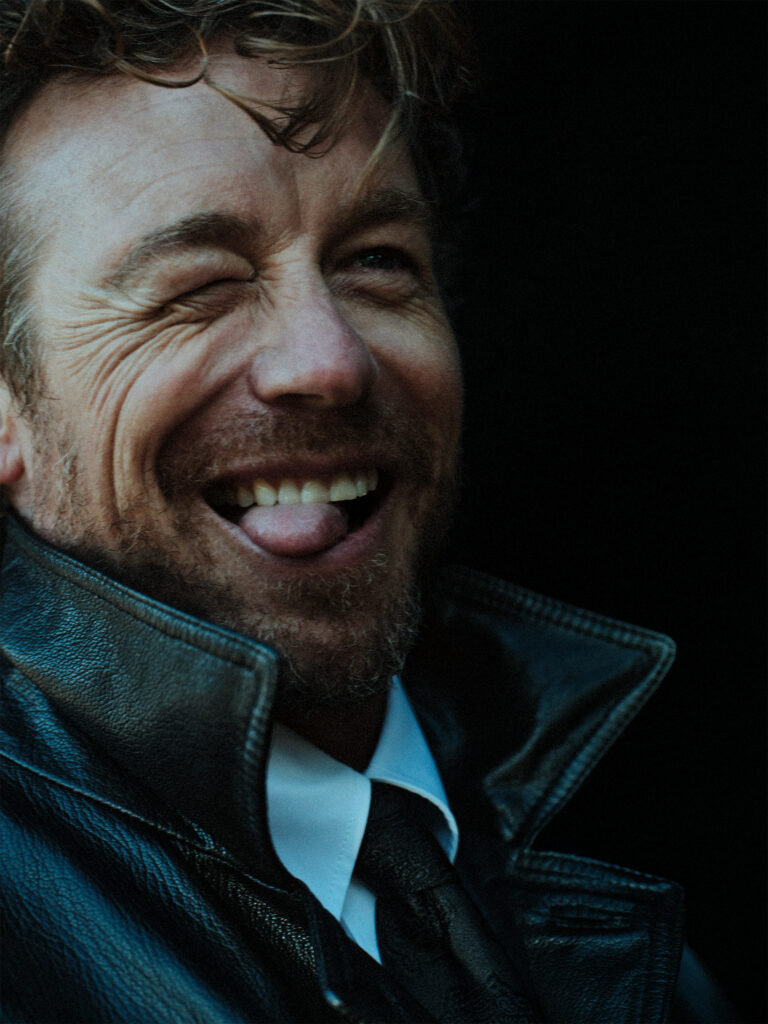
FOR AUSTRALIAN ACTORS in the ’90s, there were two main pathways into Hollywood. Either you could graduate from a prestigious acting program, make your theatre debut, star in a successful indie and, all going to plan, catch the eye of an American agent who signs and relocates you. Or, you could land a primary role on an Aussie soap opera and see where things go from there.
For Baker, it was the latter. After appearing in a handful of TV commercials, in 1992 he landed a small part on E Street, a soap set in the fictional Sydney suburb of Westside. In 1993 – the same year he won the Logie for Most Popular New Talent – he was cast to play a dreamy young Summer Bay High School teacher by the name of James Hudson in Home and Away, a type of character he slid back into in 1996, when he played Tom Summers, a science teacher who embarks on a forbidden romance with a Year 12 student in Heartbreak High. One year later, when he was 28, Baker would audition for the film that became his big break: L.A. Confidential. In a life-imitates-art turn, he was cast as an aspiring actor of the himbo variety who’s blackmailed into (and then busted) having sex with a district attorney. Though crucial to the story, the part was relatively small – alongside Kevin Spacey, Kim Basinger and Danny DeVito, fellow Aussies Russell Crowe and Guy Pearce had the starring roles. Still, Baker endeared himself to casting directors, landing parts next to Adrien Brody in Restaurant (1998) and Val Kilmer in Red Planet (2000), before scoring his first leading role in CBS TV drama The Guardian in 2001.
But The Guardian wasn’t the show that made Simon Baker into a household name – that was The Mentalist. First airing in 2008, the procedural format of the drama was nothing revolutionary, but the magnetism Baker brought to his character of Patrick Jane certainly was, with the Los Angeles Times describing his performance as “virtually irresistible”. The series ran for seven seasons, with Baker becoming one of the highest-paid actors in a drama series in 2010, when he was reportedly earning up to US$350,000 per episode. The series also made Baker a household face. He was the dreamy detective in search of his family’s killer, the suntanned Sherlock Holmes that could switch from bad cop to good cop in an instant. Not only were fans of The Mentalist captivated by Baker’s Jane, so too was an industry that, even before his scene-stealing appearance in The Devil Wears Prada (more on that shortly), had been sending Baker scripts for roles that hinged on his good looks, not necessarily the full scope of his acting ability.
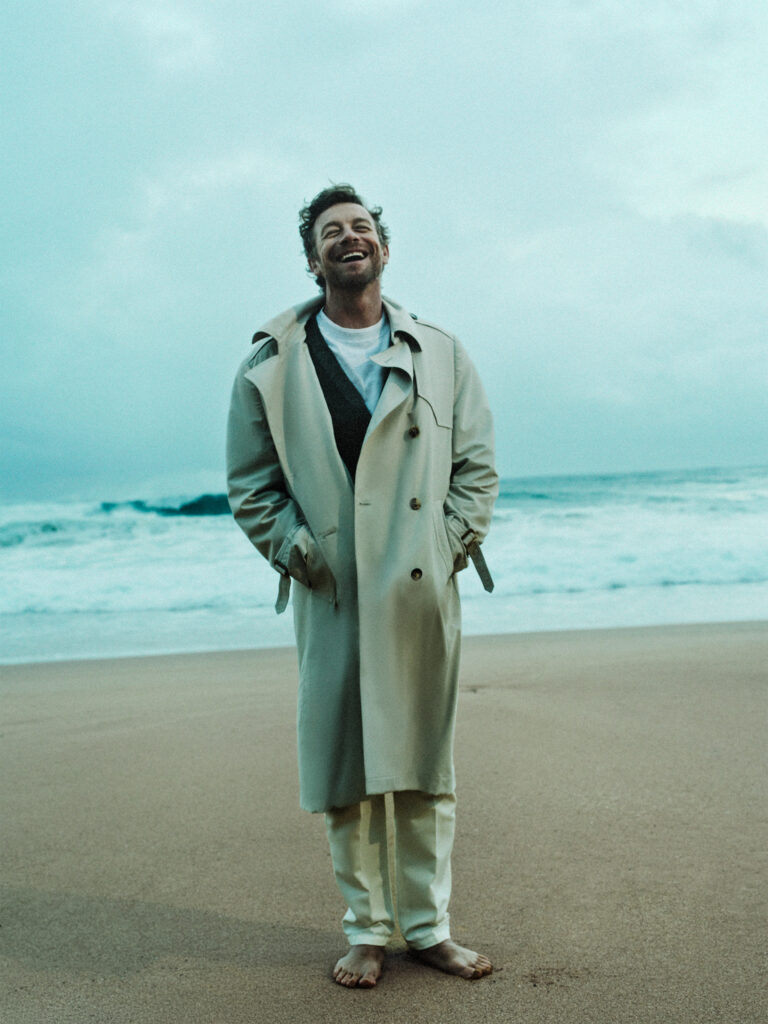
“It never sat completely comfortably on me,” says Baker as he repositions himself on the couch. “There are people in my profession that are celebrated actors that are really good at being famous. Most of the big stars these days are pretty good at being famous. And that’s another whole performance. And I couldn’t . . . I was never really able to do that. I never felt completely confident throwing myself into it completely, and going, ‘I’m gonna be a big, bright, shining star, and I’m going to do the things that you have to do’.”
Did he ever think about leaning into the leading man thing? He rubs his chin, rolls the idea around in his mind. “You know, I’ve actually thought about it a lot. I worked a bit in Australia before I went to America, then I went there, had various opportunities, but I think I had a chip on my shoulder, ’cause I first started working on an Australian soap opera. And I was around the same age as guys like Ben Mendelsohn and Noah Taylor, and during the early ’90s, those guys were the serious actors. And I was the guy in the soap opera.
“I did that movie L.A. Confidential – it’s a very small part. And then I had a couple of opportunities around big-studio movies, and I was hell-bent on, No, I don’t want to do those kinds of films. I wanted to do indies. And, I don’t know, maybe I look back naively and go, Well, I probably should have done those, and gone for it a bit more with the studio thing. Then I could’ve had my pick of the indies, because that’s how it works. I didn’t know that at the time, but I was sort of stubborn a little bit in that way.”
“There are PEOPLE in my profession that are really good at being famous. And . . . I never felt COMPLETELY CONFIDENT throwing myself into it completely, and going, ‘I'm gonna be a big, bright, SHINING STAR’.”
There was, however, one heart-throb role in a big studio movie Baker did accept. In 2006, alongside Anne Hathaway, Meryl Streep, Adrian Grenier, Stanley Tucci and Emily Blunt, Baker played the supporting role of a womanising journalist by the name of Christian Thompson in The Devil Wears Prada. His performance confirmed what the industry had suspected: Baker was awfully good playing the hot antagonist, and so the offers for Christian Thompson-style roles came flooding in.
A fact about Baker the internet loves: he has never seen The Devil Wears Prada. He’s also never entirely elaborated on why. Earlier in our interview, as we’re chatting about what he thought of The Narrow Road to the Deep North after watching it back, he reveals that, for him, acting in a project and watching it back are two completely different experiences, and the latter can often take away from the magic of the former, hence why he’s often reluctant to watch his own work.
Is this why you’ve never seen The Devil Wears Prada?
A pregnant pause. “Do you want to know why I’ve never seen The Devil Wears Prada? I can tell you why. Because someone said to me, it was a friend’s wife – and this is going to show how absurdly vulnerable and vain I am while not being at the same time, like, I oscillate between polar opposites. Anyway, she said, ‘What the fuck is going on with your eyebrows in that movie?’ And I was like, ‘What do you mean?’ And she goes, ‘They just had like their own fucking thing going on. And I was like, ‘Oh, fuck. I don’t ever wanna see that movie’.”
He laughs the laugh of someone who no longer takes themselves as seriously as they maybe once did.
Were your eyebrows something you’d felt self-conscious about before?
“No, never!” He exclaims. “I don’t want to think about that stuff. And I remember asking one of my friends, someone else that had seen the movie that I knew and I trusted – and I’m being very . . . I’m exposing myself here. I said, ‘What’s going on with my eyebrows? Someone said something about my eyebrows’. And she goes, ‘Oh, they’re just surfy eyebrows. They’re sun-bleached . . . they just probably needed a bit of a trim’. So that calmed me a little bit. But I’m like, You know what? I feel uncomfortable around it. I don’t need to see it. I had the experience of making it. And that’s what I was saying before with Narrow Road. No matter how it turned out, my experience of making the film was awesome and very fulfilling.
“But yeah. It’s gotten to the point now where The Devil Wears Prada is such a beloved movie that it’s literally like baiting the hook and throwing it overboard and getting a bite straight away, whenever I say that I’ve never seen it. So now it’s just a schtick, you know? But it was born out of this fucking eyebrow comment.”
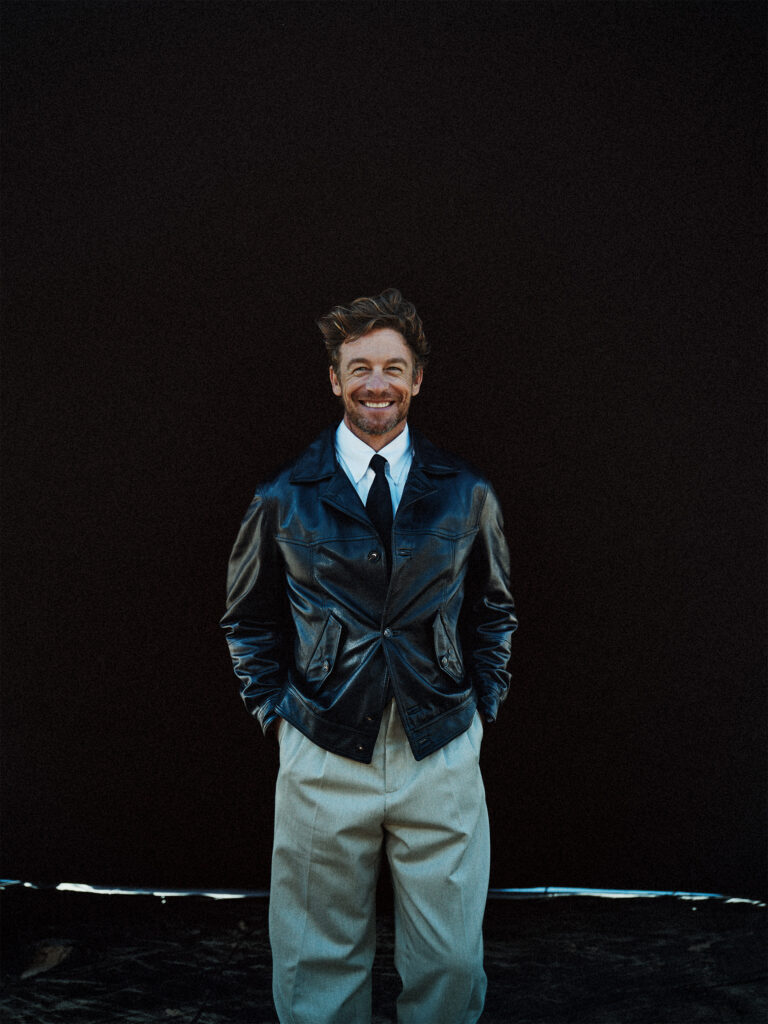
WHILE AGE IS SOMETHING many Hollywood actors spend a great deal of time and money trying to reverse, Baker, who is now 55, has found a sense of liberation in growing older. In a career sense, age has brought with it the opportunity to play more nuanced characters; to brush off that chip on his shoulder and move past the ‘guy from the soap opera’ stereotype he felt saddled with for so long. The majority of these characters have been Australian, in productions that have come across his desk since moving home in 2016.
“When I finished The Mentalist, I knew that if I was going to have any longevity to my career, I was gonna have to put myself on ice, so to speak. Like, just chill the fuck out for a while and not do anything,” he says. Around that time, Baker was given a copy of Breath, the 2008 novel by Tim Winton. The characters, setting and themes – young boys from a small coastal town navigating the contours of fear and identity through the lens of big-wave surfing – moved him profoundly, because they reminded him of his own coming of age. And so he set about having it adapted for the big screen, with the intention of playing the role of Sando, a mysterious older surfer who takes those two young boys under his wing. After a handful of meetings with potential directors, it was Garth Davis, the Australian behind 2016 biographical drama Lion, who pulled Baker aside. “He said, ‘Simon, has it occurred to you that you should direct this film? Because you speak like a director about this’,” Baker recalls. And so Breath became his directorial debut. At the 2018 AACTA Awards, Baker took home the Best Supporting Actor in a Film gong, as well as, in the same year, Best Direction in a Feature Film at the Australian Directors Guild Awards.
Baker’s next acting project was also Australian – the 2020 film High Ground, which featured a phenomenal cast of first-time actors, many from Arnhem Land in far north Australia where the film is set – and so was the one after that. And the one after that.
“It just happened that I found the opportunities here, as an actor and as a director, more interesting than what was being passed to me over in the States,” he says. “And I loved being back here. I wasn't missing America at all. And to be completely frank and blunt, the success of that show, The Mentalist, afforded me, financially, [the luxury] to be back here and work for a lot less money, or none. But the roles seemed more interesting, and I felt like I could contribute. I felt like I was in a position where I could help get a project like High Ground going, you know? My presence could help get those sorts of things off the ground. And essentially, I felt like I was going back to the guy that had that drive – that guy who wanted to do more interesting and serious work and felt like he had more in him as a person to share.”
I ask what reacquainting himself with that guy felt like. “It was a total rediscovery, in a sense. Feeling less like a commodity and more like an artist, I guess, was what that transition felt like. And it was really great.”
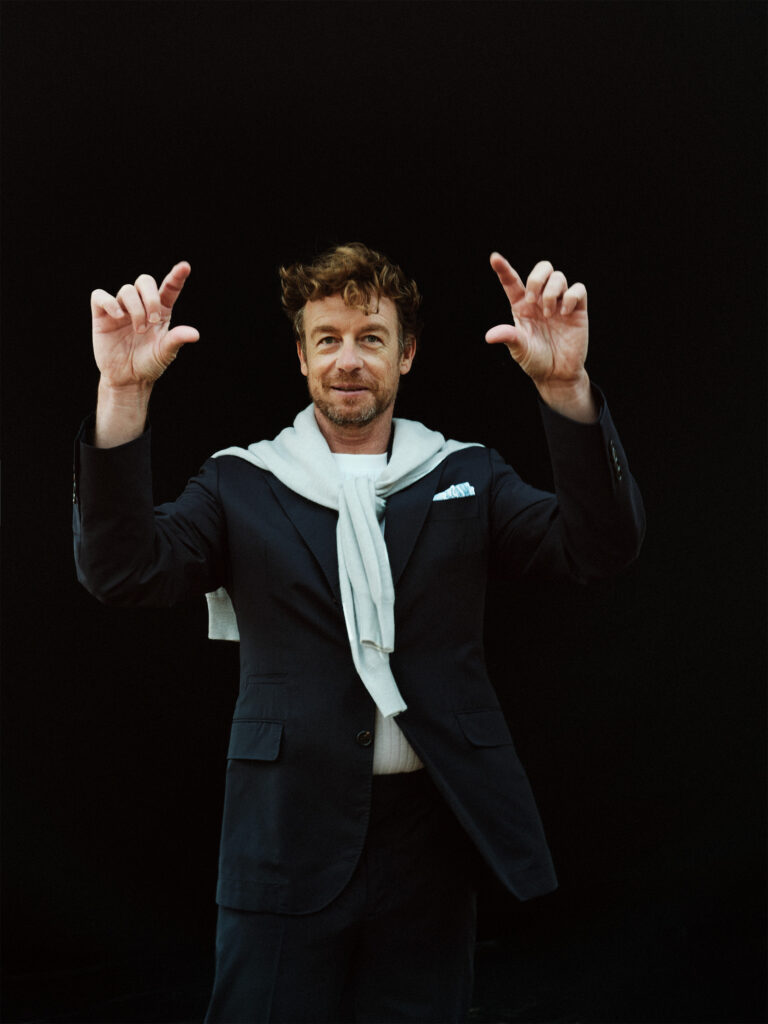
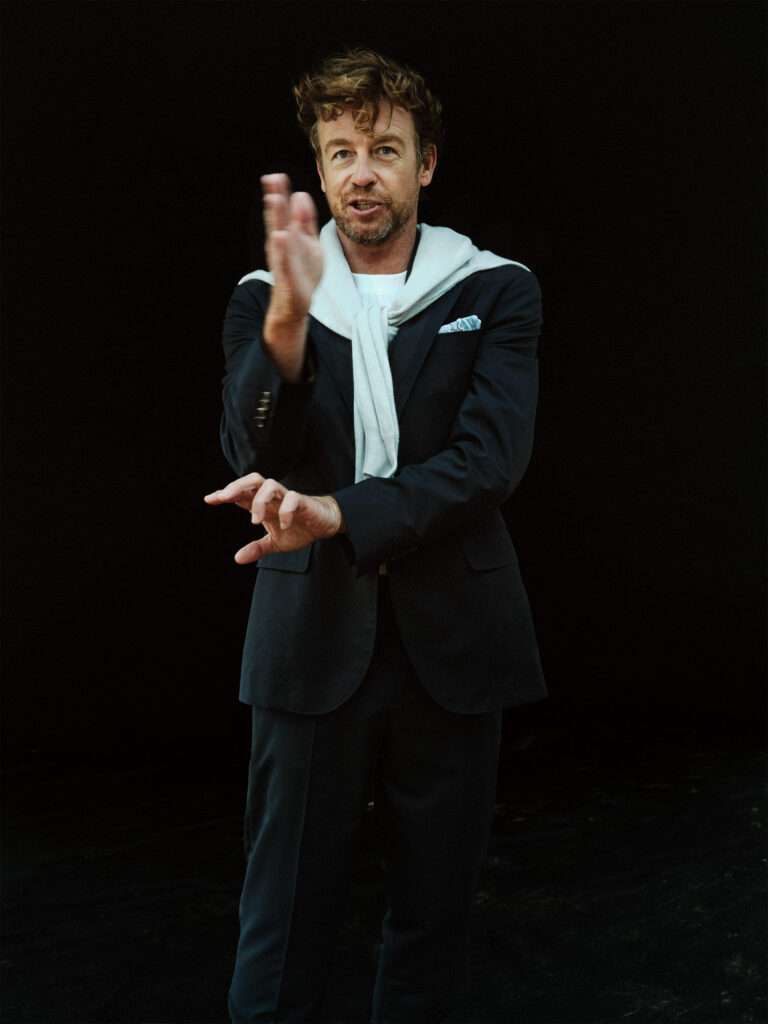
“It’s funny, because I look back at those things and, you know, a lot happened during COVID for everyone. But my marriage broke down and that was something that I was never expecting to happen in my life. And that was like, a whole reshuffle of who you are and how you exist in the world. And then, I guess, I’m someone in the public eye, so people will always have unfounded perceptions of your business, how things went down or what happened, and those things can – if you’re the type of guy who worries about your eyebrows in a fucking movie – those things can really impact your psyche.
“Separate from that, you’ve just gotta get your life back in order and figure out who you are and how you exist outside of a marriage that has lasted for that long [29 years, to fellow actor Rebecca Rigg]. And your relationship with yourself has to sort of start over again. And . . . I think that kind of coincided a lot with a lot of those choices, where I was making choices creatively for myself. I did a movie called Limbo, and around that time I just started really falling in love with what I do, with being an actor and being really happy about the opportunities that were being presented to me, and the things I could pour my pain or life experience into in different ways. I’m just trying to make sense of my humanity and I’m trying to throw it into these sorts of stories.”
“It was a total REDISCOVERY. Feeling less like a commodity and more like an ARTIST, I guess, was what that transition felt like. And it was REALLY GREAT."
The Narrow Road to the Deep North was one of these opportunities. While strapping enough to endear himself to a wife many years his junior, Keith Mulvaney is a character that presents as jovial and gregarious, yet there’s a sensitivity – an insecurity tied to his situation – that lurks beneath the surface. In other words, Mulvaney is exactly the kind of character Baker relishes bringing to life.
“Most characters I play – even if they’re a real departure from me, they’re still inherently made up of parts of me,” he muses. “I mean, the character is for everyone, but I feel like getting it right – the importance of getting it right – there’s a lot of people out there that exist in this world where they have that kind of struggle of being stoic and strong and resilient and bulletproof, but hurt deeply inside, or suffer great insecurity within them deep down. I feel an obligation with a character like Keith to share that with those people.
“I remember saying to Justin when we were shooting, my last day shooting on Narrow Road, I just said to him, Fuck, I just fucking love what I do. I love that I get to do this. I’ve never – now I’m going to get emotional – I hadn’t ever really felt it. It had just been those last few jobs. Like Limbo, Boy Swallows Universe, those opportunities. And Justin said to me, ‘I can tell, man. I can really tell. ‘Cause I can see it in your work’.
“When you do something – when you put something out there and someone comes up and says something nice about a performance, or someone says, ‘That was my dad, you know, in Boy Swallows Universe; my dad was like that’. It’s like, it’s really touching to me. That’s what I’m using my art for. I’m using my skills, my abilities and my humanity to connect with those people or to make those people feel connected. And suddenly, you go, that’s the higher thing that I’ve always sort of wanted, but I didn’t know how to articulate myself, you know what I mean? Like, that’s a higher thing. That’s really beautiful. And I’m so very grateful for that.”
Two minutes earlier, just before Baker predicted, correctly, that he was about to get emotional, I received a signal from his publicist to wrap up the conversation. I apologise, and let him know that although there’s so much more I want to ask, our hour together has come to an end. “What’s the time?” he enquires. “Go on, keep going.” Again, he laughs. “I’m on the therapy couch now.”
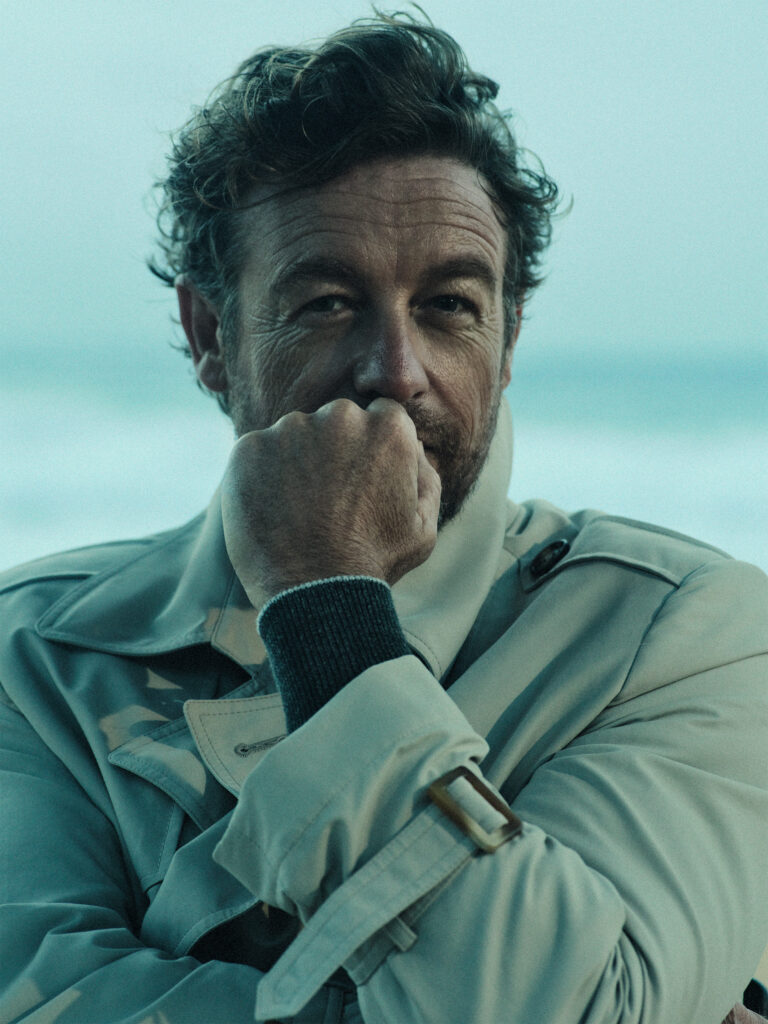
THE LAST QUESTION I ask Baker is about directing. After the success of Breath – which hit cinemas eight years ago now – is he planning to step behind the camera again? He talks about the gratitude he feels for his “day job” as an actor, that it keeps him so busy, adding that while being on set and shooting and working with other actors is energising, “there's a lot of tap dancing around the politics of getting the financing together, lots of people's opinions and ideas, and you've gotta really stay focused and that can be exhausting and draining.
“Anyway, did I make enough of an excuse for myself?” He grins. “I do get asked it all the time and I always feel like, Fucking pull your finger out, Simon. Why the fuck aren't you directing something? I should just fucking direct another movie. I should. I've gotta find something.”
Between our conversation on the therapy couch and our meeting on the beach in Sydney, I get Justin Kurzel on the phone. We chat about the intricacies of bringing The Narrow Road to the Deep North to the screen, and, towards the end of our call, I ask about that exchange he had with Baker on the actor’s final day on set.
“I know this sounds odd to say about an actor, but Simon just loves acting,” says Kurzel with a chuckle. “He loves being surrounded by actors every day. He bounces onto the set so excited to be acting. I know it's gonna sound strange, but that is kind of unusual, because I think a lot of actors get quite distracted by other stuff. But you do meet those along the way who just love acting, these true actors that got into it because it was a craft and a skill that they deeply admired and respected and wanted to learn more about and continue learning more about. He is just a true actor. I think he’s completely and utterly in love with the craft and the form of acting.”
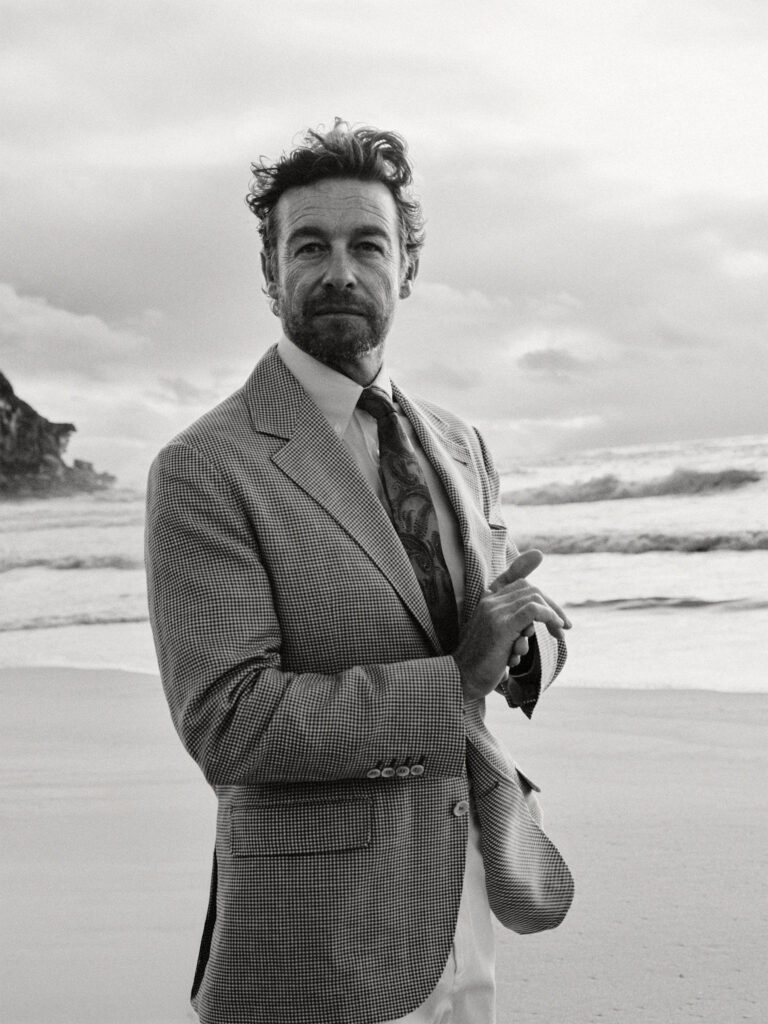
Arguably, now more than ever. “I think there’s a certain ease to getting older, as an actor,” says Baker, before we part ways on the beach. “There’s a letting go that happens that is, for me, very soothing, given that I’ve been doing what I do for so long. The joy that I get now with acting is being free, and with that freedom there’s a sense of excitement around the fearlessness of it.
“The fact that I’m older and I have a bit more mileage on me, it gives me a chance to put more of the mileage I’ve lived through into the characters I play. And that’s fun. That sort of osmosis of being able to process aspects of your own experience and your own life into the work is a really satisfying feeling.
“When I was younger, I was certainly burdened with that youthful expectation. When you’re the lead, there’s a lot of responsibility that sits on your shoulders. I’m probably mature enough to be able to handle that responsibility, but when I was younger, I maybe wasn’t mature enough, or confident enough. And I think confidence has a lot to do with it, but confidence comes with time. The longer you live with yourself the more you get to know yourself a bit better. And right now, that’s where I’m getting the joy.”
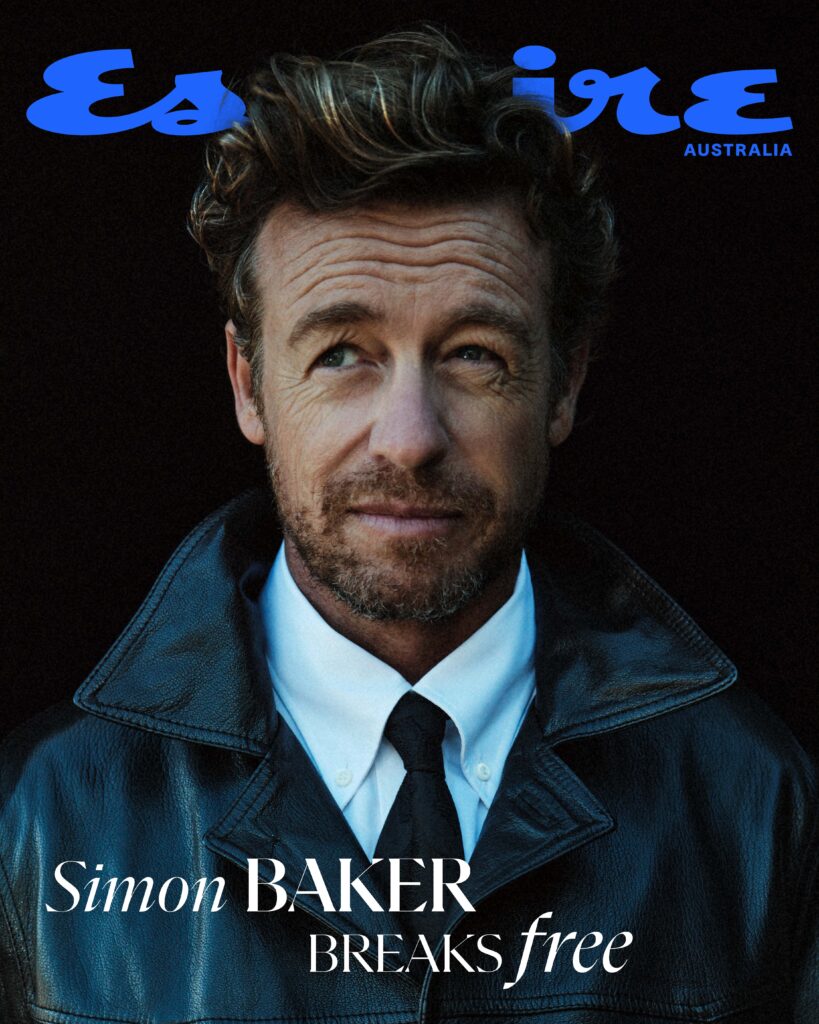
Photography: Georges Antoni
Styling: Grant Pearce
Fashion Assistant: Kailee Waller
Grooming: Linda Jefferyes
Digital Director: Arielle Katos
Videographer: Jasper Karolewski
Digi Op: Jon Calvert
First Photo Assistant: Tommy Spence
Second Photo Assistant: Finn Cochran
Producer: Jo Sinclair at The Artist Group.









